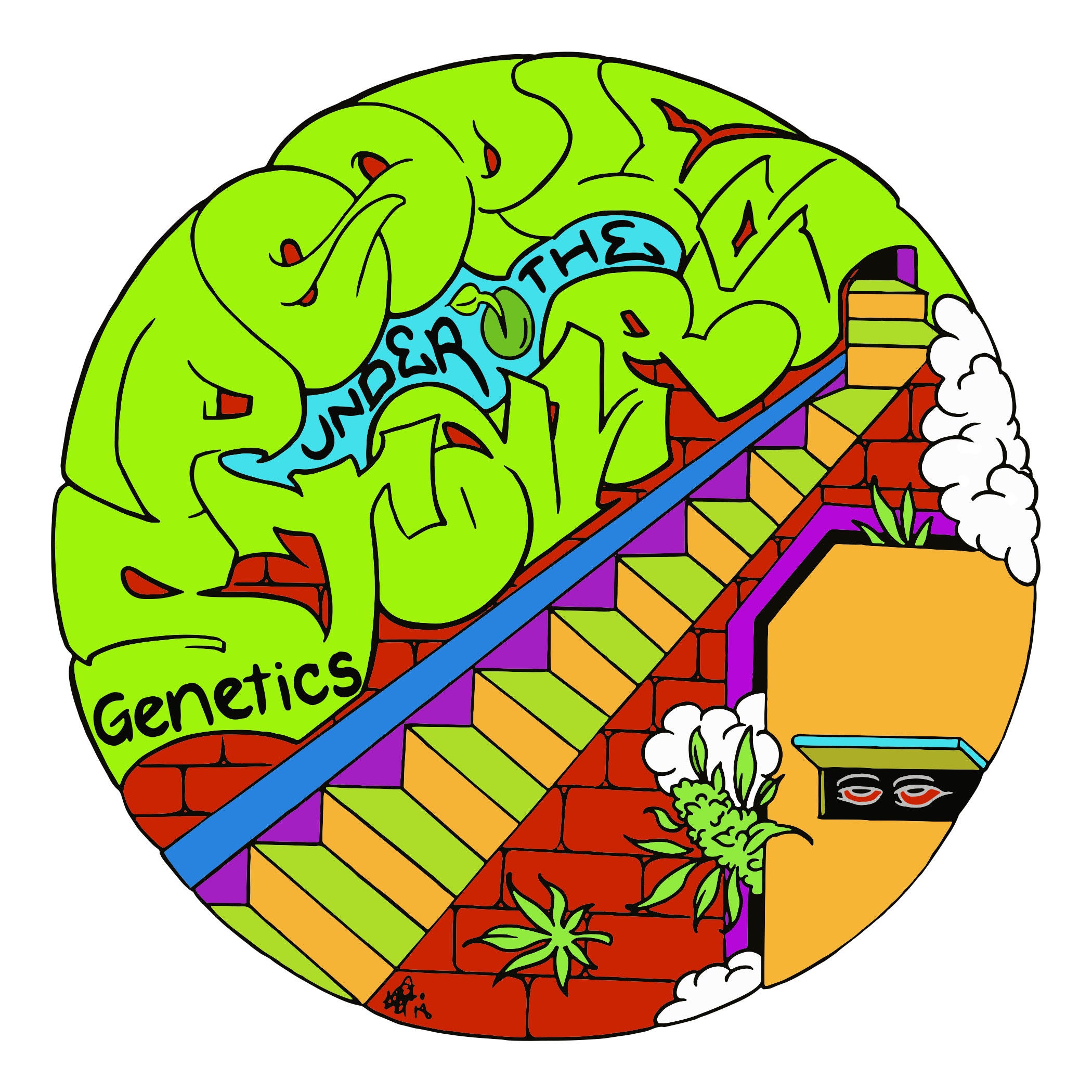Picture this: a hidden world beneath the stairs where genetics play a massive role in shaping who we are. It's like discovering an underground lair filled with secrets that could change how we understand life itself. Welcome to the fascinating realm of "people under the stairs genetics," where science meets mystery, and every discovery feels like finding a treasure map.
You might be wondering, what’s the deal with people under the stairs genetics? Is it some kind of sci-fi concept or a hidden society living in plain sight? Well, not exactly. It’s more about exploring the genetic traits that make humans… well, human! From how our DNA affects physical characteristics to the behavioral patterns we inherit, this topic dives deep into the science of what makes us unique.
So, buckle up, because we’re about to embark on a journey through the world of genetics. Whether you're a curious mind or just someone looking to learn something new, this article’s got you covered. Let’s unravel the mystery behind the people under the stairs genetics and see how it impacts everyday life.
- Catherine Omaiuml3932127700 The Sensory Journey That Defines Elegance
- Jingle Bell Run Dallas A Jolly Holiday Event To Warm Your Heart And Soul
Table of Contents
- What Is People Under the Stairs Genetics?
- The Science of DNA
- Genetic Traits We Inherit
- How Genetics Affect Appearance
- Behavioral Genetics
- Genetic Disorders
- Environmental Impact on Genetics
- Advancements in Genetic Research
- Ethical Considerations in Genetics
- The Future of Genetics
What Is People Under the Stairs Genetics?
Alright, let’s break it down. "People under the stairs genetics" isn’t just a catchy phrase—it’s all about understanding the genetic makeup that influences who we are. Think of it like this: your DNA is like a blueprint for your life, and genetics is the architect behind it. Every trait, from your eye color to your personality quirks, can be traced back to your genetic code.
Genetics isn’t just about physical traits, though. It also plays a massive role in how we behave, how we think, and even how we react to certain situations. So, when we talk about "people under the stairs genetics," we’re diving into the hidden layers of what makes each of us different and unique.
Why Is It Important?
Understanding genetics can help us in so many ways. For one, it can help us identify potential health risks and take preventive measures. It can also help us understand why certain traits run in families and how we can harness this knowledge to improve our lives.
- Taylor Rushing The Rising Star Whos Taking The World By Storm
- Gerit Grimm The Unsung Hero Of Modern Design And Innovation
The Science of DNA
Let’s get scientific for a moment. DNA, or deoxyribonucleic acid, is the molecule that carries our genetic information. It’s like a recipe book for life, and every cell in our body contains a copy of it. DNA is made up of four chemical bases: adenine (A), guanine (G), cytosine (C), and thymine (T). The order of these bases determines the instructions for building and maintaining an organism.
But here’s the kicker—DNA isn’t just a static code. It’s dynamic and can change over time due to mutations or environmental factors. This means that while we inherit certain traits from our parents, our environment can also play a significant role in shaping who we become.
How Does DNA Work?
DNA works by providing instructions for creating proteins, which are the building blocks of life. These proteins determine everything from the color of your hair to how your body processes food. It’s like a chain reaction—DNA makes RNA, RNA makes proteins, and proteins make you, me, and everything in between.
Genetic Traits We Inherit
Now, let’s talk about the fun stuff—traits! We inherit a ton of traits from our parents, and these traits are passed down through our DNA. Some of these traits are obvious, like eye color or height, while others are more subtle, like a predisposition to certain diseases.
Here’s a quick list of some common inherited traits:
- Eye color
- Hair texture
- Height
- Earlobe attachment
- Blood type
How Are Traits Passed Down?
Traits are passed down through something called alleles, which are variations of a gene. You get one allele from each parent, and the combination of these alleles determines your traits. For example, if both of your parents have brown eyes, there’s a good chance you’ll have brown eyes too. But if one parent has blue eyes and the other has brown, things get a little more complicated.
How Genetics Affect Appearance
Genetics plays a huge role in how we look. From the shape of our noses to the color of our skin, our appearance is largely determined by our DNA. But it’s not just about looks—genetics can also affect how we age and how susceptible we are to certain skin conditions.
For instance, some people are more prone to wrinkles due to their genetic makeup, while others may have a natural resistance to aging. It’s like a genetic lottery, and every ticket is different.
Can Genetics Be Changed?
While we can’t change our DNA, we can influence how it’s expressed. This is where epigenetics comes in. Epigenetics is the study of how environmental factors can affect gene expression without changing the underlying DNA sequence. So, while you might have a genetic predisposition to a certain trait, your lifestyle choices can either enhance or suppress that trait.
Behavioral Genetics
Behavioral genetics is all about how our genes influence our behavior. It’s like the nature vs. nurture debate on steroids. While environmental factors certainly play a role in shaping our behavior, genetics can also predispose us to certain traits, like being introverted or extroverted.
Studies have shown that genetics can even influence things like aggression, anxiety, and addiction. But here’s the thing—just because you have a genetic predisposition to a certain behavior doesn’t mean you’re destined to act on it. It’s all about how you interact with your environment.
What Can We Learn from Behavioral Genetics?
Behavioral genetics can help us understand why certain behaviors run in families and how we can intervene to change them. For example, if we know that a certain genetic mutation increases the risk of addiction, we can develop targeted therapies to help individuals overcome it.
Genetic Disorders
Unfortunately, not all genetic traits are positive. Some genetic mutations can lead to disorders that affect health and quality of life. Examples include cystic fibrosis, sickle cell anemia, and Huntington’s disease. These disorders are caused by mutations in specific genes and can be passed down from generation to generation.
But here’s the good news—thanks to advancements in genetic research, we’re now able to identify these mutations early and develop treatments to manage them. It’s like turning a curse into a blessing.
How Can We Prevent Genetic Disorders?
Preventing genetic disorders starts with understanding them. Genetic counseling can help individuals and families make informed decisions about reproduction and health. And with technologies like CRISPR, we’re now able to edit genes and potentially eliminate harmful mutations altogether.
Environmental Impact on Genetics
As we mentioned earlier, the environment can have a significant impact on how our genes are expressed. This is where epigenetics comes into play. Factors like diet, stress, and exposure to toxins can all affect how our genes function.
For example, studies have shown that a healthy diet can help prevent certain genetic disorders from manifesting. On the other hand, exposure to environmental toxins can increase the risk of developing certain diseases.
What Can We Do to Protect Our Genes?
The best way to protect our genes is to live a healthy lifestyle. This means eating a balanced diet, exercising regularly, and avoiding harmful substances like tobacco and excessive alcohol. It’s all about giving your body the tools it needs to thrive.
Advancements in Genetic Research
Genetic research has come a long way in recent years. Thanks to technologies like CRISPR and next-generation sequencing, we’re now able to study genes in ways we never thought possible. These advancements are helping us understand the complexities of genetics and develop new treatments for genetic disorders.
But it’s not just about curing diseases—genetic research is also helping us understand the origins of life itself. By studying the genetic makeup of different species, we’re gaining insights into how life evolved and how we’re all connected.
What’s Next for Genetic Research?
The future of genetic research is bright. With continued advancements in technology and a growing understanding of genetics, we’re on the cusp of some incredible breakthroughs. From personalized medicine to gene editing, the possibilities are endless.
Ethical Considerations in Genetics
With great power comes great responsibility, and genetics is no exception. As we continue to unlock the secrets of DNA, we must also consider the ethical implications of our discoveries. For example, should we be allowed to edit human genes? And who gets to decide which traits are desirable?
These are tough questions, but they’re ones we need to answer if we want to ensure that genetic research benefits everyone, not just a select few.
How Can We Ensure Ethical Use of Genetics?
Ensuring ethical use of genetics starts with transparency and accountability. Researchers must be open about their methods and findings, and governments must establish regulations to prevent misuse. It’s all about finding a balance between innovation and responsibility.
The Future of Genetics
The future of genetics is exciting and full of possibilities. From curing diseases to enhancing our understanding of life itself, the potential is limitless. But with great power comes great responsibility, and it’s up to all of us to ensure that genetics is used for the greater good.
So, the next time you hear about "people under the stairs genetics," remember that it’s more than just a catchy phrase—it’s a glimpse into the fascinating world of genetics and all the possibilities it holds.
What’s Next for You?
Now that you’ve learned all about people under the stairs genetics, it’s time to take action. Share this article with your friends, leave a comment, or dive deeper into the world of genetics. The more we learn, the better equipped we are to face the challenges of tomorrow.
In conclusion, genetics is a powerful tool that can help us understand who we are and where we come from. By embracing this knowledge, we can unlock the secrets of life and create a brighter future for everyone. So, let’s keep exploring, keep learning, and keep pushing the boundaries of what’s possible.



Detail Author:
- Name : Calista Schaden V
- Username : trevor88
- Email : bhartmann@baumbach.biz
- Birthdate : 2005-07-03
- Address : 69476 Landen Fords Suite 848 Mohamedbury, WV 88894-6006
- Phone : 845.652.8756
- Company : Mraz, Romaguera and Kertzmann
- Job : Terrazzo Workes and Finisher
- Bio : Nostrum voluptas est aut minus est debitis temporibus. Aut quasi sed vero magnam. Et voluptas esse porro dicta nisi sed cum.
Socials
instagram:
- url : https://instagram.com/jana8134
- username : jana8134
- bio : Esse aut aut ducimus sed eos. Pariatur officiis qui sequi. Ad quam est rerum iure ut aut.
- followers : 6185
- following : 2074
twitter:
- url : https://twitter.com/jana_pacocha
- username : jana_pacocha
- bio : Quibusdam sapiente minima temporibus perspiciatis quas adipisci. Fugiat iste inventore et rem labore sit. Nulla vero ut aut deleniti et.
- followers : 3815
- following : 1866
tiktok:
- url : https://tiktok.com/@jana7882
- username : jana7882
- bio : Et blanditiis vitae ipsa id atque est eaque.
- followers : 3698
- following : 1992
linkedin:
- url : https://linkedin.com/in/pacochaj
- username : pacochaj
- bio : Et necessitatibus qui reiciendis at assumenda.
- followers : 4742
- following : 155